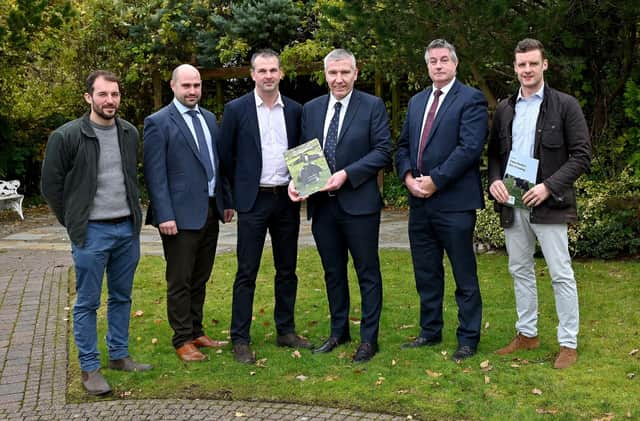'Data in action' is key to dairy sustainability


Looking to the future of dairy, the conference centred around the theme of ‘Data in Action’ to highlight the importance of data collection, research, innovation and knowledge exchange in informing the farming practices on dairy farms.
Hosted at the Seagoe Hotel, Portadown, the event was part of a multi-country European Milk Forum promotion programme to highlight the positive role of the dairy sector for climate action and the environment.
Advertisement
Advertisement
George Moffett, DAERA’s Deputy Director of Agriculture Policy Division, gave a policy update on future farm support and development programme which includes initiatives such as the Soil Nutrient Health Scheme, Livestock Genetics Improvement Programme and the Carbon Benchmarking Programme.
Professor John Gilliland provided an overview of the farmer led Arc Zero programme and the subsequent learnings about measurement and use of data to help inform practical mitigations and policy development. He outlined the financial challenges farmers will face in achieving the harder to reach environmental targets and highlighted the vital role that food producers play in delivering public goods, including supporting the local economy and in providing nutrient rich produce.
The event also saw the launch of the RSPB’s biodiversity guidelines, ‘Guide to Nature Positive Dairy Farming’ which have been developed in partnership with DCNI and the Nature Friendly Farming Network (NFFN). This pioneering report provides a comprehensive roadmap towards nature friendly practices within the dairy sector.
Speaking about the role of the sector in delivering a more sustainable future, Dairy Council CEO, Ian Stevenson said: “As we reflect on the Symposium and more broadly the past six years of the EU Sustainable Dairy Programme, the outlook is positive for the future sustainability of the sector. Our farmers and processors are following evidence-based guidance from the Department and from knowledge and research institutions such as CAFRE and AFBI, investing in new technologies and implementing new processes all with the aim of being more sustainable.
Advertisement
Advertisement
“Recently I heard the phrase ‘Comfortable co-existence’, which I think is a fitting description of the way climate change mitigation works hand in hand with productive and profitable farming whilst retaining the culture and identity of the farming family model. It’s important when we talk about targets and emissions that we don’t lose sight of the fact that the dairy sector is made up of 3,200 dairy farming families, who are the fabric of rural Northern Ireland.
“New figures from DAERA show the great strides that the sector has made to lower its carbon footprint whilst retaining economic profitability. In the past 33 years we have seen the carbon intensity of milk production decrease from an average of 1,927 grams of CO2 equivalent per kilogram of Energy Corrected Milk (ECM) in 1990 to 1,214 grams in 2021, with milk production expanding by 92% in that time frame. This demonstrates that the sector is very much up to the challenge and the will and resilience is there to work towards reasonable and achievable targets.”
To close, local farmers John Oliver from Limavady, Mark Blelock from Aldergrove and David Thompson from Sion Mills, took part in a moderated discussion with DCNI Chief Executive Ian Stevenson. The panel touched upon the impact of sustainability schemes on the ground and the challenges and opportunities they present for farmers. The panel also discussed the importance of communication, the need for dairy farming to be profitable and appealing for current and future farming generations as well as ensuring farmers’ health and wellbeing is supported.
To view the existing sustainability information from the dairy sector, visit the Dairy Council NI website www.dairycouncil.co.uk